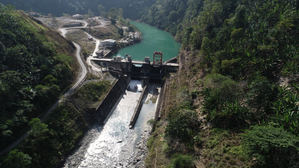New Delhi: The Union Cabinet, chaired by Prime Minister Narendra Modi, on Wednesday approved the proposal of the Ministry of Power for providing central financial assistance to the state governments of the northeastern region towards their equity participation in the development of hydroelectric projects through joint venture (JV) collaborations between state entities and central public sector undertakings (CPSUs).
This scheme has an outlay of Rs 4,136 crore to be implemented from FY 2024-25 to FY 2031-32. A cumulative hydro capacity of about 15,000 MW would be supported under the scheme.
The scheme would be funded through 10 per cent Gross Budgetary Support (GBS) for the North Eastern Region (NER) from the total outlay of the Ministry of Power, according to a Cabinet communique issued after the meeting.
The scheme, formulated by the Ministry of Power, provides for the formation of a joint venture company for all the projects of a Central PSU with the state government. The grant towards the equity portion of the state government of NER would be capped at 24 per cent of the total project equity, subject to a maximum of Rs 750 crore per project. The cap of Rs 750 crore for each project would be revisited, if required, on a case-to-case basis.
The ratio of equity of the CPSU and the state government in the JV would be maintained at the time of disbursing of the grant, the statement said.
Central financial assistance would be limited to only viable hydroelectric projects. States would be required to waive or stagger free power and or reimburse SGST to make the project viable. With the introduction of this scheme, participation of the state governments in the hydro development shall be encouraged and risks and responsibilities shall be shared in a more equitable manner. Issues such as land acquisition, rehabilitation and resettlement, and local law and order issues would be reduced with state governments becoming stakeholders. This would avoid time and cost over-run of the projects, the statement said.
This scheme will play a significant role in harnessing the hydropower potential of the region, as well as bring huge investment and provide a large number of direct employment opportunities to the local people, along with indirect employment/entrepreneurial opportunities through transportation, tourism, and small-scale business.
Development of hydroelectric projects shall also contribute towards the realisation of India’s Nationally Determined Contribution (INDC) of establishing 500 GW renewable energy capacity by 2030 and would help the integration of renewable energy sources in the grid thus enhancing flexibility, security and reliability of the national grid.
The Centre has been taking several policy initiatives to address the issues impeding hydropower development. To promote the sector and to make it more viable, the Cabinet, on March 7, 2019, approved measures that included declaring large hydropower projects as renewable energy sources, hydropower purchase obligations, rationalisation measures through escalating tariffs, budgetary support for flood moderation in storage HEP and budgetary support for the cost of enabling infrastructure such as roads and bridges.
–IANS


Comments are closed.